DUP deal aimed at restoring power sharing in Northern Ireland is published
- Published
- comments
The Northern Ireland secretary sets out his four "key elements" in the package of measures to restore power sharing at Stormont.
A deal between the UK government and the Democratic Unionist Party (DUP), external will reduce checks and paperwork on goods moving from Great Britain to Northern Ireland.
The changes apply to GB goods which are staying in Northern Ireland and will mean no routine checks on those goods.
The DUP has been boycotting Stormont's power-sharing government for two years in protest at post-Brexit trade rules.
The deal could see the return of devolution within a matter of days.
Those changes involve the maximum flexibility allowed under a previous EU/UK deal it is understood will be acceptable to the EU.
On Tuesday, the UK and EU Joint reached agreement to make changes to that deal to allow NI to benefit from UK Free Trade Agreements.
Speaking in the House of Commons on Wednesday, Northern Ireland Secretary Chris Heaton-Harris said the result is a deal that "is the right one for Northern Ireland and for the union".
He added that it is time for politicians to "come together and work together".
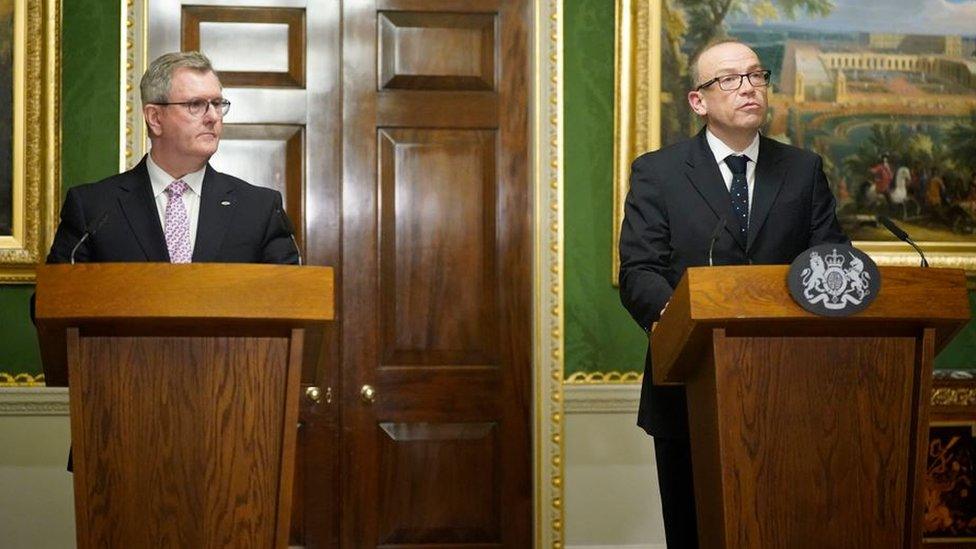
Sir Jeffrey Donaldson and Chris Heaton-Harris held a joint press conference at Hillsborough after the deal was published
"I trust we will have the conditions to see Stormont up and running swiftly," he said.
Mr Heaton-Harris added that "many of us in this chamber last week could not fail to have been struck by [Jeffrey Donaldson's] unshakeable advocacy on behalf of the unionist cause".


So now we have the precise detail, in black and white - or some might say red, white and blue is more apt given the document's title, Safeguarding the Union.
But beyond the practicalities, it's the political consequences that loom large.
The government is now embarking on a hard sell of the plan alongside the DUP leader, after those long months of negotiations.
It desperately wants this to work, not just so that devolution returns but so that the Sunak administration can chalk it up as a win.
Supporters and opponents of it are already starting to appear on our airwaves and that noise - on both sides - will get louder in the coming hours.

The DUP had demanded changes to the way goods are traded between Northern Ireland and Great Britain in order for it to end its Stormont stand-off.
On Monday night, the DUP's 120-strong executive agreed to endorse the deal.
The government will also introduce two pieces of legislation to guarantee Northern Ireland goods can be sold in Great Britain in all circumstances and to affirm Northern Ireland's place in the UK.
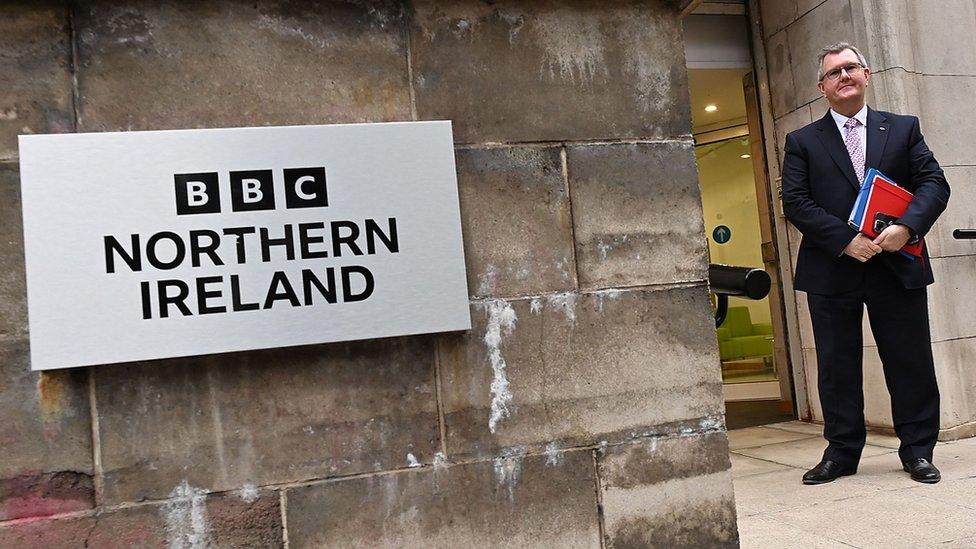
DUP leader Sir Jeffrey Donaldson was doing an interview with the BBC on Wednesday as details of the deal broke
Appearing on BBC Radio Ulster's Talkback programme on Wednesday, DUP leader Sir Jeffrey Donaldson was asked if the deal would remove the trade border in the Irish Sea and he claimed that it would.
"For goods coming in from the UK, our objective was to remove the Irish Sea border and that is what we have achieved," he said.
"We're no longer in a situation where if you bring goods in to sell in Northern Ireland, you need a customs declaration."
He added that for people bringing goods into Northern Ireland to sell in Northern Ireland or for their own own consumption, there would be "no customs declaration required, no physical checks (on those goods) at Northern Ireland ports".
The DUP leader argued this "removes the border in the UK internal market".
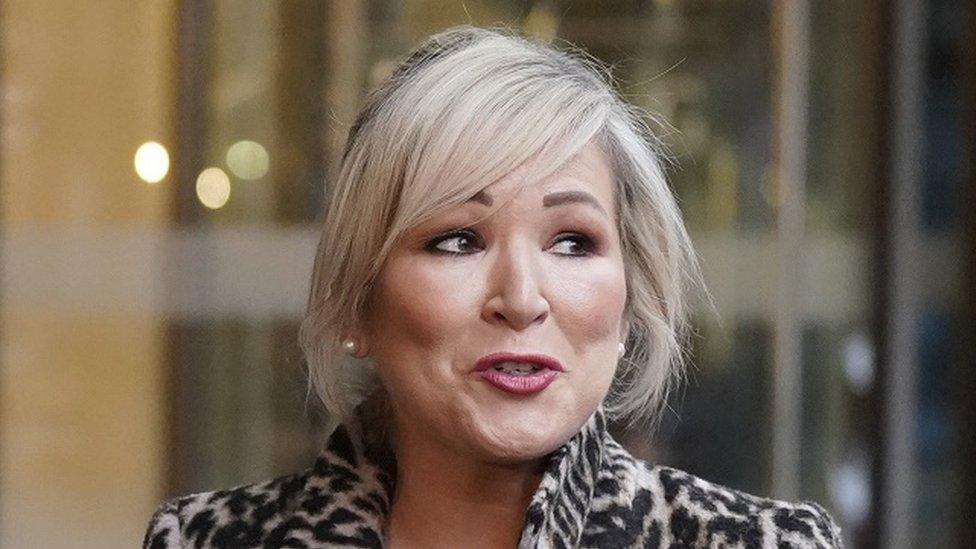
Sinn Féin is the largest party in NI after the last assembly election and will nominate Michelle O'Neill for the position of first minister
The legislation is expected to be fast-tracked through Parliament on Thursday.
Ulster Unionist Party (UUP) leader Doug Beattie said the first meeting of the new assembly is likely to be on Saturday and the first executive meeting is expected on Monday.
'Broken promises'
Sir Jeffrey praised Prime Minister Rishi Sunak, saying he had "delivered where others haven't".
The DUP leader compared the current occupant of No 10 with one of his predecessors, Boris Johnson, saying that while Mr Johnson "promised us a lot of things, he didn't deliver them".
Sir Jeffrey said the deal was not perfect and he had not achieved everything the DUP had wanted, explaining there was more work to do on the "important issue" of veterinary medicines.
Westminster leaders welcome talks to restore power-sharing in Northern Ireland
The prime minister has hailed the "significant steps" taken by the DUP to agree the deal.
Opening Prime Minister's Questions on Wednesday, Mr Sunak thanked the DUP for its efforts, and said the other parties had shown patience over the past two years.
He said there was now the prospect of getting power sharing back up and running, "strengthening our union and giving people the local, accountable government they need".
The prime minister added this would offer a "brighter future for Northern Ireland".
Labour leader Sir Keir Starmer also described it as an "important moment" and that all sides needed to work together to kickstart devolution.
The foreign secretary, Lord Cameron, explained the package of measures contained within the deal during a call with the European Commission's Maroš Šefčovič on Wednesday.
They both "agreed on the high importance" of seeing the Northern Ireland Executive restored, a spokesperson said.
Mr Šefčovič "noted that the commission will analyse carefully the texts," they added.
Lord Cameron and Mr Šefčovič also discussed the proposed joint EU-UK solution on tariff rate quotas and reiterated their shared commitment to the Windsor Framework.
'Hope and optimism'
The main Stormont parties met Tánaiste (Irish deputy prime minister) Micheál Martin in Belfast on Wednesday.
Speaking after the meeting, Sinn Féin vice-president Michelle O'Neill said there's been "some hope and optimism" on a return of a Northern Ireland Executive.
As the party which won the most seats at the last assembly election in 2022, Sinn Féin would be entitled to take the role of first minister.
That would make Sinn Féin's Ms O'Neill the first person from a nationalist background to become first minister of Northern Ireland.
As the second biggest party, the DUP would be entitled to nominate a deputy first minister.
The two roles have always shared exactly the same powers and responsibilities and are equal in status in all but name.
Asked if she was ready to be Northern Ireland first minister, Ms O'Neill said: "I am absolutely up to the task of leading that executive to work with all the executive parties and delivering what matters to the people."
'Kept out of the detail'
Ulster Unionist leader Doug Beattie said his party had a "good meeting" with Mr Martin but maintained that they were annoyed at how much they've been "kept out of the detail" of the new deal.
In the House of Commons, Colum Eastwood, leader of the Social Democratic and Labour Party ( SDLP) asked Mr Heaton-Harris if he will convene a process with all political parties in the Irish government to look at how institutions of the Good Friday Agreement can be reformed "to make sure no one party can pull them down again".
Mr Heaton-Harris said that when it comes to the question of reform in Northern Ireland "this is a conversation that should be started within Stormont and by the people of Northern Ireland and their elected representatives".
Meanwhile, Alliance MP Stephen Farry asked the NI Secretary about the £3.3bn financial package offered before Christmas and to acknowledge "there needs to be fuller discussion about reviewing NI's fiscal floor".
- Published31 January 2024
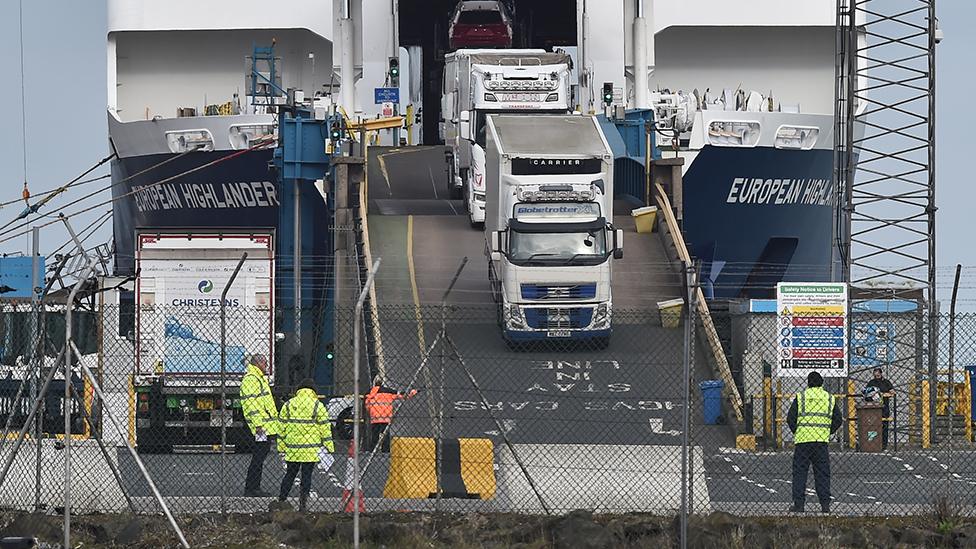
- Published31 January 2024
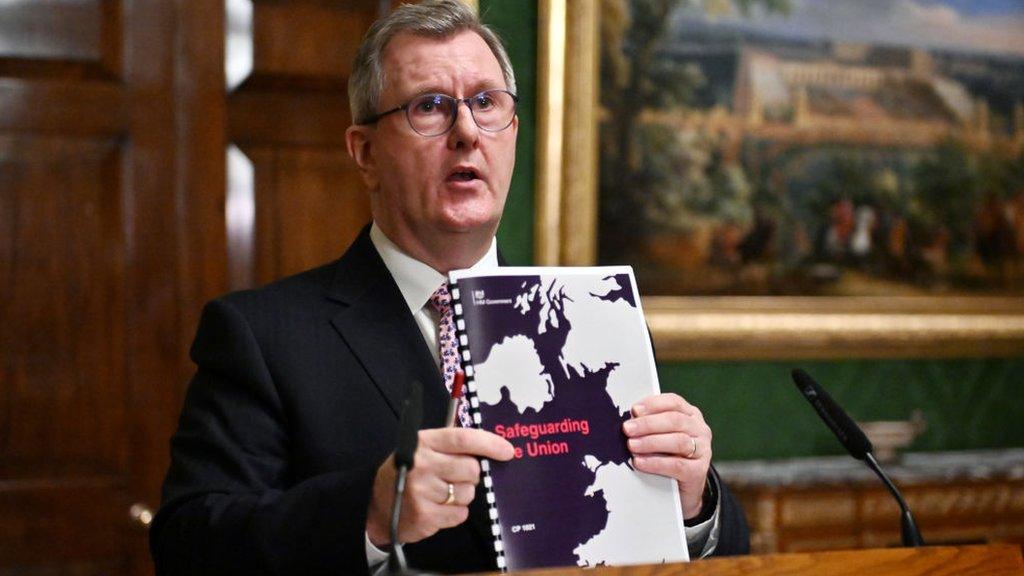
- Published31 January 2024
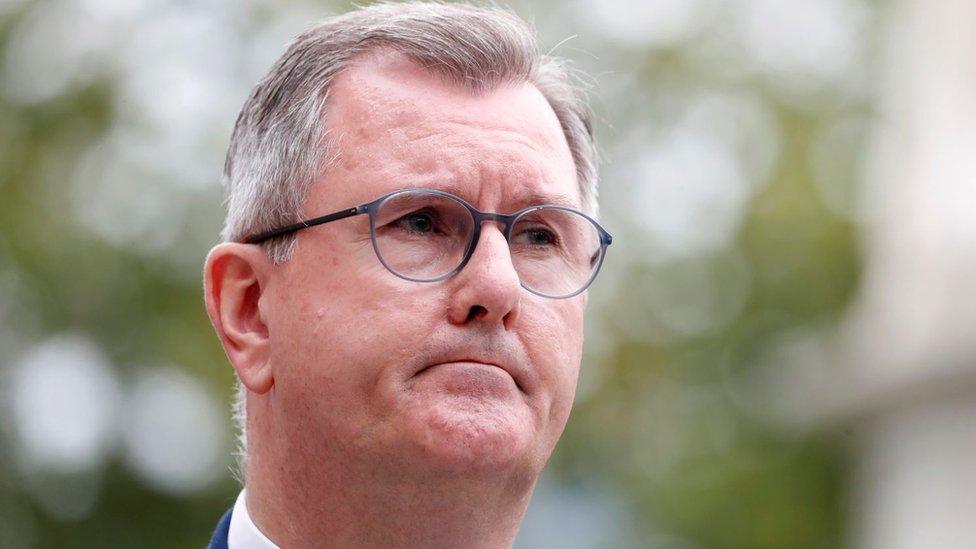
- Published3 February 2024
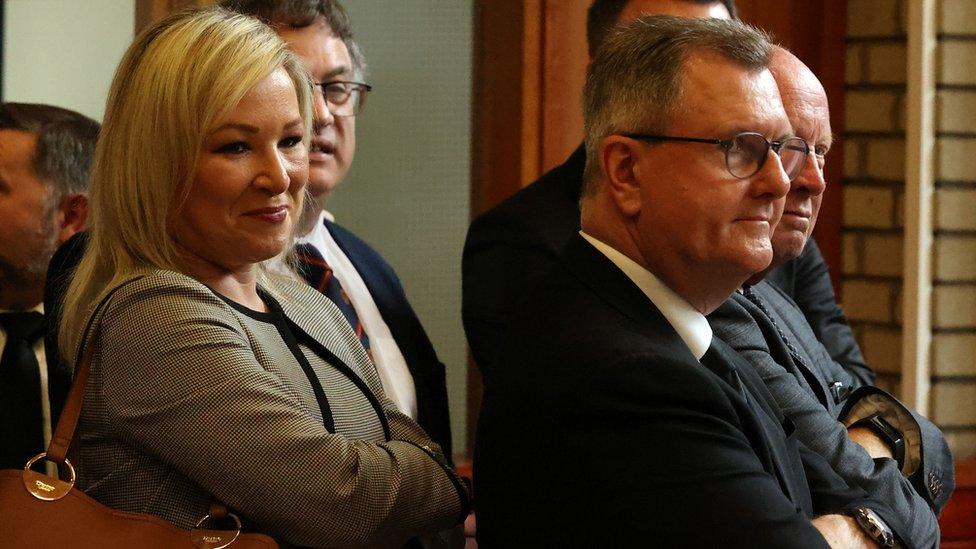
- Published31 January 2024
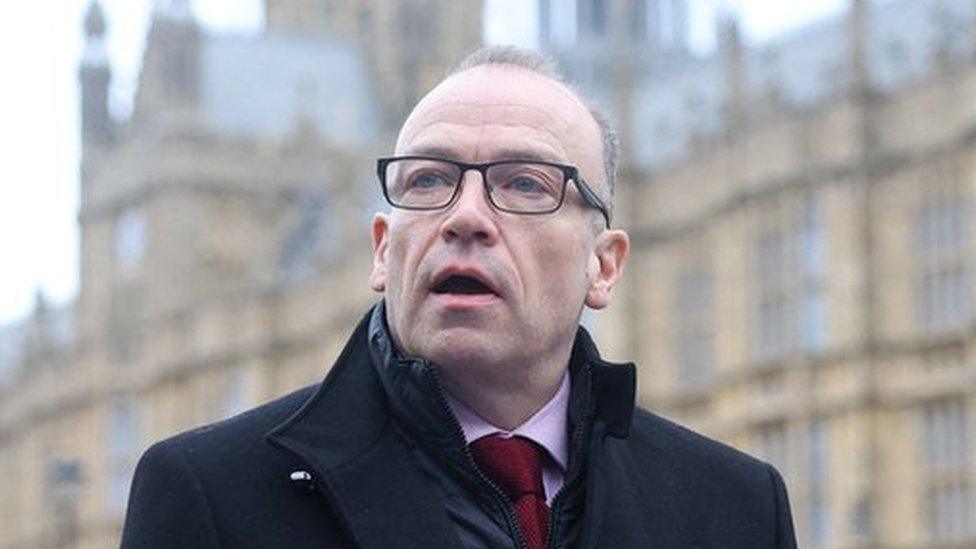
- Published30 January 2024
